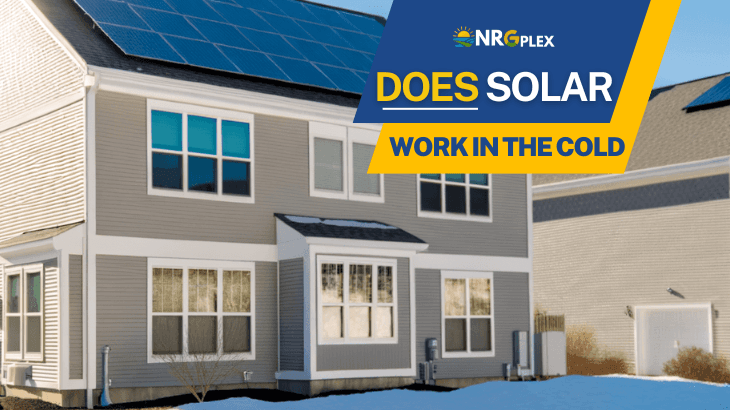
Do Solar Panels Work Better in Cold Weather?
As homeowners in Massachusetts consider making the switch to solar energy, one common question arises: do solar panels work better in cold weather? With Massachusetts’ varied climate, particularly its cold winters, understanding how temperature affects solar panel efficiency is crucial. In this blog post, we’ll explore the relationship between solar energy and cold temperatures, the benefits of installing solar panels, and why an in-home consultation with NRG Plex is the best first step in your solar journey.
The Science Behind Solar Panels
Solar panels convert sunlight into electricity through a process called the photovoltaic effect. The core elements of a solar panel—silicon cells—are most efficient when they absorb sunlight. However, it’s essential to understand how temperature directly impacts their performance.
Temperature and Solar Panel Performance
While it might seem counterintuitive, solar panels can perform better in colder temperatures than in hotter ones. Here’s why:
- Efficiency Increase: The efficiency of solar panels generally increases as temperatures drop. For most solar panels, a decrease in temperature can lead to improved electricity production. This is due to lower resistance in the system, allowing them to convert solar energy into electricity more effectively.
- Sunny Days in Winter: Massachusetts experiences sunny winter days where solar production can be surprisingly high. Even with snow on the ground, sunlight reflects off the white surface, increasing the amount of light that reaches your panels.
- Less Energy Loss: High temperatures can cause solar panels to operate less efficiently, resulting in energy loss. In contrast, the cooler Massachusetts winters can promote better performance in your solar system.
Solar Power Savings in Massachusetts
One of the primary reasons homeowners consider installing home solar panels in MA is the potential for significant cost savings. Here’s how going solar translates into financial benefits:
- Lower Utility Bills: Solar panels generate free electricity after installation. According to studies, homeowners with solar panel systems see a reduction in their electricity bills by 50-90%—providing your household with substantial long-term savings.
- Net Metering: Massachusetts offers a net metering program that allows you to earn credits for the excess power your system produces. These credits can be used to offset future energy costs, further increasing your savings.
- Increased Home Value: Homes equipped with solar energy systems see an increase in property value. Studies show that homes with solar panels sell for more than those without, making it a smart investment.
MA Solar Incentives
Massachusetts homeowners are incredibly fortunate to have access to generous MA solar incentives. These incentives significantly reduce the upfront costs associated with solar installation, making it easier to transition to clean energy. Key incentives include:
- Federal Tax Credit: The Solar Investment Tax Credit (ITC) allows you to deduct a significant percentage of your solar installation costs from your federal taxes.
- State Rebate Programs: Massachusetts offers various rebate programs and financial incentives designed to make solar energy more accessible to all homeowners.
- SREC II Program: Solar Renewable Energy Certificates (SRECs) allow homeowners to earn payments for the solar electricity generated by their systems, adding another layer of savings.
The Solar Installation Process
Understanding the solar installation process can alleviate concerns and make the transition smoother for homeowners. Here’s an overview:
- Consultation: The process begins with an in-home consultation with one of our expert field agents from NRG Plex. During this visit, you’ll discuss your energy needs, assess your roof’s suitability for solar panels, and review available incentives.
- System Design: Based on your consultation, our team will create a customized solar energy system designed to maximize efficiency and return on investment.
- Installation: Once you approve the design, we’ll handle all aspects of the installation. Our experienced professionals ensure everything is installed correctly and complies with local regulations.
- Activation and Monitoring: After installation, we’ll help activate your solar system and provide monitoring tools to help you track your solar production and savings.
Environmental Benefits of Going Solar
Beyond the financial savings, switching to solar energy has profound environmental benefits. By choosing solar electricity for your home, you are contributing positively to your community and the planet. Here are some key benefits:
- Reduced Carbon Footprint: Solar energy is clean, renewable, and abundant. By using solar power, you help reduce greenhouse gas emissions, combat climate change, and promote a healthier environment.
- Sustainable Energy Source: Unlike fossil fuels, solar energy is sustainable and will be available for generations to come. Utilizing solar power diminishes reliance on non-renewable resources.
Conclusion
As the question arises, do solar panels work better in cold weather? The answer is a resounding yes! For homeowners in Massachusetts, the benefits of solar energy are especially clear during colder months. From increased efficiency and significant cost savings to tax incentives and environmental advantages, the reasons to consider solar installation grow stronger each day.
Are you ready to explore the possibilities of solar energy? NRG Plex is here to help guide you every step of the way. We invite you to reach out to us for your complimentary in-home consultation. Our dedicated team will ensure you have all the information needed to make an informed decision about going solar in Massachusetts.
Contact us today or call us at (888) 857 -4041 for your free quote. Remember, Have The Sun Pay Your Electric Bill!






